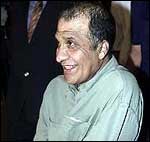|
| Help | |
| You are here: Rediff Home » India » News » Interview » Afghan Ambassador Masood Khalili |
|
In the third segment of a six-part interview to Managing Editor Sheela Bhatt and Nikhil Lakshman, Masood Khalili, who served as the Afghan ambassador in India until recently, says he hopes the Americans will stay in his country till their job is finished. Part I: 'The Taliban have returned' Part II: 'The Americans are not occupiers' How long do you think the Americans should stay in Kabul? I hope they stay until their job is finished. I don't know. It's hard for me to know how long the Americans will stay. But I hope and I pray they stay till a time they fulfil their promise, that is till they not allow the Taliban, not allow Al Qaeda [Images], not allow the wrong forces to bring Afghanistan to what it was before September 11, 2001. Until and unless you do not achieve your goal in Afghanistan along with the Afghan people you have failed. Leaving the snake half wounded will be more dangerous. Never and ever ever leave your enemy half wounded, never and ever ever take them unseriously, never and ever allow them to think even psychologically that if you go, they can come back. The nature of Afghanistan as a geopolitically strategic country demands that the US keeps its promise till the end. Geopolitically Afghanistan has been, is and will be an important region for the United Nations, for NATO, for America. We fought against the Soviets, the world helped us -- not much, not little -- but they helped us. The Soviets left because of the war in Afghanistan and because of the problems in their own country. In the meantime, Afghanistan was abandoned. One goal was achieved -- that the Soviets left. But the economic help, reconstruction, political institutionalisation, bringing democracy to the country needed our friends to stay with us. They abandoned us. Leaving Afghanistan now will create a more dangerous problem than what it was before September 11, 2001. We should all be careful -- the United Nations, NATO and America. Every three months, we should have a joint meeting to assess the situation, to not allow the enemy to return. The enemy is not a simple enemy. The enemy has an organisation and money spread all over the world. The enemy has maybe more than 3,000, 4,000 suicide bombers. The enemy's tactic is dangerous. This is why we have to be careful. Leaving Afghanistan will indeed allow the enemy to come back in a real dangerous way. Mr Karzai is referring to those commanders who are not careful about their activities in Afghanistan and some drug lords. Afghanistan has a lot of drug problems. So that is an enemy we also have to be careful of. How can you handle someone like Abdul Rashid Dostum for instance?Dostum -- I don't call him a warlord. Dostum was fighting along with the Soviets against us (the mujhaideen). So he was a commander on that side. And then he was fighting against the Taliban with us. Maybe the first one God knows we say that he was wrong, but the second case he was very good (smiles). Who were the warlords you say are not good? Who do I identify as the bad commanders? The commanders who are causing problems. The commanders who do not believe in the new democratic institutions, who disturb the democratic process and the security of the country, who encourage the drug lords. It is said the warlords still control most of the country and that President Karzai does not have much influence outside of Kabul. I found the people of Afghanistan have become more mature than they were before. When I heard that Mr Karzai had got American bodyguards I said, 'An Afghan leader with foreign bodyguards! My wife said, 'I don't think people will criticise, they will understand.' When I next went to Kabul I went to a place called Jabalsara. We called everyone -- about 200, 300 people. Intellectuals, mullahs, commanders and all. I asked, 'What do you think about Mr Karzai's American bodyguards? Is it wrong? No one thought it was wrong. One old man spoke up: 'We want him to be alive. The world has become very dangerous and cruel, we should keep the leader alive.' | |||||||||||||||||||||||||||||||||||||||||||||||||
|
|
|
| © 2008 Rediff.com India Limited. All Rights Reserved. Disclaimer | Feedback |
 Participants at this week's conference on Afghanistan in London [
Participants at this week's conference on Afghanistan in London [